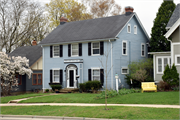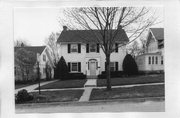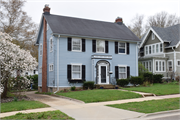Property Record
2229 ETON RIDGE
Architecture and History Inventory
| Historic Name: | Edward & M. Helen Samp Residence |
|---|---|
| Other Name: | |
| Contributing: | Yes |
| Reference Number: | 35776 |
| Location (Address): | 2229 ETON RIDGE |
|---|---|
| County: | Dane |
| City: | Madison |
| Township/Village: | |
| Unincorporated Community: | |
| Town: | |
| Range: | |
| Direction: | |
| Section: | |
| Quarter Section: | |
| Quarter/Quarter Section: |
| Year Built: | 1924 |
|---|---|
| Additions: | |
| Survey Date: | 19932019 |
| Historic Use: | house |
| Architectural Style: | Colonial Revival/Georgian Revival |
| Structural System: | |
| Wall Material: | Clapboard |
| Architect: | |
| Other Buildings On Site: | |
| Demolished?: | No |
| Demolished Date: |
| National/State Register Listing Name: | West Lawn Heights Historic District |
|---|---|
| National Register Listing Date: | 3/5/1998 |
| State Register Listing Date: | 10/17/1997 |
| National Register Multiple Property Name: |
| Additional Information: | Map code is 070921411040 City of Madison, Wisconsin Underrepresented Communities Historic Resource Survey Report: Kathryn Clarenbach was born in 1920 and grew up in Sparta, Wisconsin. She came to Madison in 1937 to study Political Science at the University of Wisconsin. She worked in Washington, D.C. for some time after college, then returned to Madison to pursue a Ph.D. in Political Science, which she received in 1946. After marrying and spending some time in New York, Clarenbach returned to Madison again in 1960. By 1962, she was working as an assistant in the Dean of Women’s office on the University of Wisconsin-Madison campus. In 1962, she co-chaired a pioneering conference at the Wisconsin Center that “explor[ed] educational and employment needs and opportunities for women in the university and Madison area.” A year later, she helped plan a similar conference and persuaded Wisconsin Governor John Reynolds to establish a statewide Commission on the Status of Women. Reynolds did, seeing the need to “investigate the role of women in Wisconsin and suggest ways in which women can become fuller participants in our society.” Clarenbach was chosen to head the Commission (she did so until 1979, with a two-year break). By 1964, she was the director of university education for women. In 1966, while she was still heading the state commission and working on educational reforms for women at the University of Wisconsin-Madison, she co-founded the National Organization for Women (NOW) in Washington, D.C. with several other women, including Betty Friedan. Clarenbach was chosen as the new organization’s chairperson, serving until 1970, and NOW was headquartered for a short time in her Madison home. By the time the Women’s Liberation Movement crystallized in the late 1960s, Kathryn Clarenbach was a veteran feminist and organizer. In the late-1960s and 1970s, she successfully lobbied for reforms in Wisconsin laws regarding marital property, divorce, and sexual assault. In 1970, she was elected president of the Interstate Association of Commissions on the Status of Women. She was a founding member of the Association of Women Faculty (AFW) in 1970 and elected to its governing board in 1971. Clarenbach worked with the AFW in the early 1970s, organizing faculty and staff on the Madison campus and other University of Wisconsin System campuses and laying the groundwork for the Women’s Studies Program to be approved in 1975. In 1977, she served as the Executive Director of the National Commission for the Observance of International Woman’s Year, an effort that culminated in the pivotal National Women’s Conference in Houston, Texas. That influential conference brought together major feminist leaders including Gloria Steinem, Betty Friedan, and Bella Abzug, alongside Coretta Scott King, Rosalynn Carter, Betty Ford, and Lady Bird Johnson. The national strategy developed at the conference asked for federal involvement in removing barriers to women in twenty-six areas, including childcare, education, and health. After Governor Lee Dreyfus disbanded the state Commission on the Status of Women in 1979, of which she was still the chair, Clarenbach helped create the Wisconsin Women’s Network. Clarenbach finished her career as a professor of political science at the University of Wisconsin-Madison in 1988 and died in 1994. She lived at 2229 Eton Ridge during her entire career in Madison. |
|---|---|
| Bibliographic References: |
| Wisconsin Architecture and History Inventory, State Historic Preservation Office, Wisconsin Historical Society, Madison, Wisconsin |



